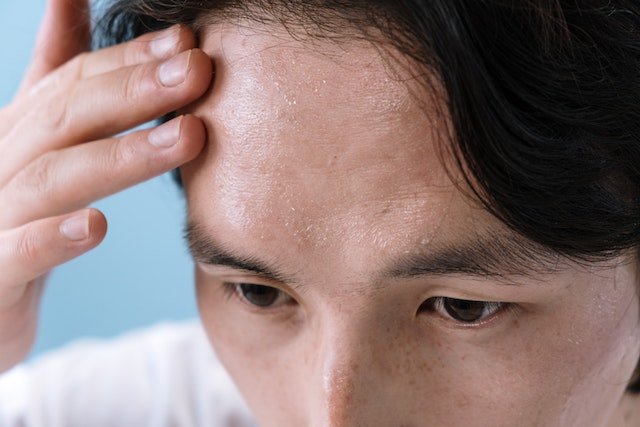The effects of stress on skin and hair are not a new concern. Stress is the root of all health issues and when it comes to your skin and hair, your state of mind is easily reflected with them.
Stress has become a standard part of your life. It has a profound impact on your overall well-being. Not only does stress affect your mental and emotional health, but it can also take a toll on your physical appearance.
The present times have made the use of words like stress and anxiety way more common than they should be. Whether it’s during the holidays or in normal times, stress has become an inevitable part of your routine.
Out of the many ways stress affects the human body, its effects on your skin and hair are usually overlooked. In this article, we will delve into what are the effects of stress on skin and hair, and how can save yourself from them.
What are the Effects of Stress on Skin and Hair? How to Cope with it?
Let’s understand the effects of stress on skin and hair one by one:
1. Effects of Stress on Skin
When you experience stress, your body releases a hormone called cortisol.
Even though anxiety initially occurs in your brain, a large portion of its consequences are physical. These are easily visible on your skin and they don’t just end at tensed shoulders and furrowed eyebrows.
Everyday stress has a great impact on the skin. It causes a change in the chemistry between your brain and body, which is usually called the “brain-skin connection”.
Your body releases the fight-or-flight hormone called cortisol when under stress. Cortisol is also known as the “stress hormone”.
Elevated levels of cortisol can disrupt the delicate balance of your skin, leading to various issues. One of the most common effects of stress on skin is increased oil production, which can result in acne breakouts. Additionally, stress can impair the skin’s barrier function, making it more susceptible to irritants and allergens.
More stress leads the adrenal gland to release more cortisol. This increases the activity of your sebaceous gland to produce more oil and sebum. Other consequences of cortisol release are:
- It increases inflammation in the body
- It delays the healing and disrupts the skin’s natural barrier
- It weakens the skin’s immune system weakening it to defend itself
- It might even lead up to conditions like eczema, rosacea, and psoriasis
- It leads to oxidative stress that results in wrinkles, lines, and lackluster skin
- It causes some less-understood skin problems like skin picking and dysmorphia
Because stress is usually expressed with emotional facial expressions, it is closely linked to the various skin problems mentioned above.

From dry, itchy skin to fine lines and wrinkles, stress and the overflow of feelings that comes along can harm the natural look of your skin.
2. Effects of Stress on Hair
Stress is your worried reaction toward problems and difficult situations. While you usually relate anxiety with issues related to the mind, as much as the skin, stress has its effects on your hair too.
Just like your skin, your hair can also be negatively affected by stress. Stress-induced hair loss is a common concern for many people. When you’re under stress, your hair follicles can enter a resting phase, causing hair to shed more than usual. In severe cases, this can lead to noticeable thinning or even bald patches.
While hair loss is quite common, hair loss due to stress is not so common. Another hair problem that happens due to extreme stress and poor food habits is white hair.
Stress leads to different kinds of hair loss. These are:
- Alopecia Areata: In this situation, a portion of hair suddenly falls out. It even leads to causing hair loss in patches and ends with baldness.
- Telogen Effluvium: This happens when the number of hair follicles growing hair reduces. This leaves the hair follicles dormant, which finally leads to hair loss.
As mentioned above, the release of cortisol leads the sebaceous glands to produce more oil and sebum. This sebum clogs the scalp pores and hinders hair growth.
Your everyday stress doesn’t just mess with the “brain-skin connection”, it also affects the biochemistry of your hair follicles. This leads them to the rest phase in hair growth.
How to Cope with Effects of Stress on Skin & Hair?
With the present scenario and work-life run, it’s impossible to entirely eliminate stress from your lives. However, there are some ways in which you can manage and minimize the effects of stress on skin and hair.
Here are four strategies you can try and consider:
1. Practice Stress-Relieving Techniques
Engage in stress-relieving activities that help you relax and unwind. Whether it’s meditation, yoga, or simply spending time in nature, finding stress-relieving techniques that work for you can significantly benefit your skin and hair.
2. Prioritize Self-Care
Make self-care a priority in your daily routine. This includes getting enough sleep, eating a balanced diet, and exercising regularly. Taking care of your overall health will not only reduce stress but also promote healthier skin and hair.
3. Establish a Skincare Routine
Developing a consistent skincare routine tailored to your skin type and needs can help you counteract the effects of stress. Don’t fall for the skincare myths and build a routine that’s best for your skin. Cleanse your skin gently, moisturize daily, and use products with ingredients known to soothe and nourish the skin.
4. Nourish Your Hair
Give your hair the care it deserves by using gentle shampoos and conditioners. Avoid excessive heat styling and instead opt for nourishing hair masks, wooden combs, and oils to keep your hair healthy and vibrant.
Along with all these, here are a few more ways in which you can calm your mind to combat the effects of stress on skin and hair:
- Start reading to improve your focus and thus decrease stress.
- Don’t skip your meals. A balanced diet and a healthy you should be a priority always.
- Talk to somebody you can trust and confide in to share what’s bothering you.
- If you’re under extreme stress, get professional help – consult a therapist.
Conclusion
In the kind of life we are living today, it is extremely easy to feel anxious and stressed about different things in life.
The self-comparison that we do, the social media lies we see around us, and the pace at which our lifestyles run – all contribute to the increased levels of anxiety and stress.
Though stress is an unavoidable part of life, it doesn’t have to wreak havoc on your skin and hair. By implementing stress-reducing techniques, prioritizing self-care, and adopting a proper skincare and hair care routine, you can minimize the negative effects of stress and maintain a healthy, radiant appearance.
As much as your skin and hair require outside attention with all the care and DIYs, they equally need attention from the inside.
So, you must know that you are loved, you have people who care about you and you are not alone. You must make efforts to reach out to your loved ones when you feel burdened. There is always, always somebody willing to stick by your side.
Don’t let the temporary problems ruin your permanent home, your body.
Take life with a pinch of salt and live in the moment.
I’ll see you seen with a new topic on the blog.
Until next then,
Don’t forget to be kind to yourself.



